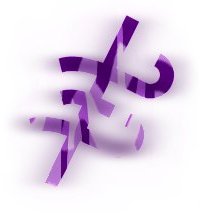
|

|
Saturday 7th October 2006
Someone at work was going on about rolling two six-sided die and the probability of a certain total number coming up. I wanted to write this just to clear up my confusion, but also because humans seem to have this huge problem with probability. Hence, is it a good idea to pick the numbers 1, 2, 3, 4, 5 and 6 in the National Lottery? The answer is of course: NO. You shouldn't pick these numbers because they aren't particularly random and, therefore, loads of other people will pick these numbers (or will they though? Maybe people do actually think, "Those numbers are never, ever gonna come up. Six numbers in a sequence? Impossible.") and, therefore, any money you win is gonna be split several ways. The sequence 1, 2, 3, 4, 5 and 6 is just as likely to happen as is 13, 19, 22, 23, 30, 45 or 4, 5, 7, 13, 19, 25 or whatever. All these sequences should be equally likely in the National Lottery, but the best thing to do is surely to pick a completely random sequence, the kind of sequence that not many people are gonna choose. But hey, I digress. So what about these dice then? I think the problem related to the sum of the two dice being 7. So, if the first die lands on a 1 and the second on a 6, then we got a total of seven. Pretty simple so far. You got two dice, so there's 36 possible outcomes of how these two dice will fall. Of these 36 combinations, 6 of these will yield a total of seven. Therefore, I guess you could say there's a 6 in 36 (or 1 in 6) chance that the total when two dice is thrown will be 1 in 6. But I think my colleague was suggesting that in knowing how the first die has landed, you have a better chance of knowing how the other die will land, knowing that there's a 1 in 6 chance of the total being seven. This didn't make any sense to me, but I don't think the whole 1 in 6 chance of the total being seven was brought up. Like I say, I really didn't understand what the problem was. You throw an unloaded six-sided die and the probability of a certain number coming up is 1 in 6. End of story. Die does not care about what number came up before, what number other die came up with or anything.
|
|
|

